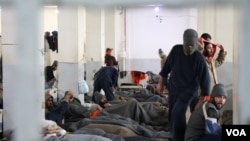Help is on the way to the U.S.-backed Syrian Democratic Forces, less than a week after a riot at a Syrian prison holding thousands of captured Islamic State fighters allowed some to briefly escape.
Coalition officials told VOA Friday that the aid is for the maintenance of more than a dozen prisons and detention camps in Syria, and that recent shipments included face masks, shields and batons for prison guards.
“The U.S. military continues to provide support to repair and renovate SDF detention facilities that house ISIS fighters, to help ensure the SDF can continue to detain ISIS fighters securely and humanely,” coalition spokesman Col. Myles Caggins said, using an acronym for the terror group.
Only officials with the SDF’s political wing are skeptical, contending the last time they got assistance for the prisons was last April, when they were holding an estimated 7,000 IS prisoners, not the 10,000 they watch over now.
“So far nothing,” Sinam Mohamad, the U.S. representative of the Syrian Democratic Council, told VOA.
"They promised us to help and renovate the prisons, but unfortunately nothing happened," she said, adding the facility where the captured IS fighters rioted “it is not secure for such dangerous prisoners.”
Other help has already arrived.
Coalition officials say they delivered $1.2 million in medical supplies to help both the SDF and civilian authorities in northeastern Syria battle the potential spread of the coronavirus.
The shipment, which arrived last week, contained latex gloves, masks, surgical kits, defibrillators and oximeters for hospitals in Hasakah and Shaddadi. Additional supplies were included for the SDF and for the troops guarding IS prisoners.
Still, Mohamad warns even that "is not sufficient." “Still we need for thousands in the [detention] camps," she said.
Concerns about the overcrowded prisons and detention camps, which hold tens of thousands of IS family members, while growing in urgency, are not new.
U.S. and SDF officials have continuously voiced fears, especially about the prisons, describing them as “makeshift” facilities – schools, hospitals and other abandoned buildings that were quickly converted to contain upwards of 10,000 IS fighters captured as the terror group’s self-declared caliphate collapsed in February and March of 2019.
U.S. officials have also warned repeatedly that while they were “good enough” for the moment, it would be dangerous to consider the prisons a permanent solution, especially for the approximately 2,000 foreign fighters languishing in SDF custody.
“The best disposition option for these ISIS detainees is for their home countries to repatriate them,” Caggins said Friday.
Despite ongoing talks, though, many European countries have refused to take back IS fighters, and proposals by the SDF to hold tribunals to decide the fate of the foreign fighters have yet to garner international support.
As a result, with so many IS prisoners in limbo, tensions at the various prison facilities have been rising, boiling over last Sunday at the Goiran prison in Hasakah where detainees broke down doors and destroyed security cameras while briefly taking control of one of the floors.
Initial accounts by prison officials also indicated some captured IS fighters appeared to escape, though by Monday, SDF and U.S. military officials said the riot had been put down and that all the detainees were in custody.
SDF officials describe the riot in Hasakah as alarming but point out it is just the most recent in a series of disturbances and attempted jailbreaks, all of which have caused them to ask for more help.
They say problems have also been growing since last October, when Turkey’s incursion into northeast Syria forced the SDF to evacuate prisons in areas that fell under Turkish control.
Now, combined with growing fears about the potential spread of the coronavirus, facilities that were already at a breaking point are being strained even more.
"This is not sustainable,” Chris Maier, director of the Pentagon's Defeat IS Task Force, said last September, prior to the Turkish incursion. “There are not prisons controlled by forces in northeast Syria that can house 10,000 ISIS fighters.”




